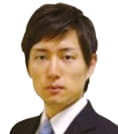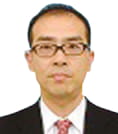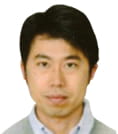- JST Home
- /
- Strategic Basic Research Programs
- /
 CREST
CREST- /
- Research Director/
- Creation of Innovative Core Technologies for Nano-enabled Thermal Management/
- [Thermal Control] Year Started : 2017
[Thermal Control] Year Started : 2017
Kenichi Uchida
Spintronic thermal management
Research Director
Kenichi Uchida

Group Leader
Research Center for Magnetic and Spintronic Materials
National Institute for Materials Science
Collaborator
| Toshu An | Associate Professor Graduate School of Advanced Science and Technology Japan Advanced Institute of Science and Technology |
| Hosei Nagano | Professor Graduate School of Engineering Nagoya University |
| Yoshio Miura | Group Leader Research Center for Magnetic and Spintronic Materials National Institute for Materials Science |
Outline
The purpose of this research is to construct fundamental science and technology for thermal energy management based on magnetic materials and spintronic functions. In this research, the following will be realized: (1) Nano thermal controller that enables pinpoint heating and cooling, (2) Reconfigurable thermal diode that rectifies heat currents depending on the direction of magnetization, (3) Thermal circulator that bends heat currents depending on the direction of magnetization, and (4) Thermal switch that modulates temperature and thermal conductivity by the application of magnetic fields. These functions and devices will be developed toward thermal management applications.
Taku Ohara
Reduction of thermal boundary resistance at solid-solid junctions by means of molecular surface modification and nanoscale thermal interface materials
Research Director
Taku Ohara

Professor
Institute of Fluid Science
Tohoku University
Collaborator
| Gota Kikugawa | Associate Professor Institute of Fluid Science Tohoku University |
| Masahide Sato | Professor School of Engineering Utsunomiya University |
| Hosei Nagano | Professor Graduate School of Engineering Nagoya University |
| Masahiro Motosuke | Professor Faculty of Engineering Tokyo University of Science |
| Takashi Yagi | Group leader Research Institute for Material and Chemical Measurement National Institute of Advanced Industrial Science and Technology |
Outline
In modern electronic devices such as power modules essential for power conversion, the heat flow from the semiconductor elements to the outside of the devices is important for the dissipation and utilization of the large amount of generated heat. Here, the thermal boundary resistance, which disturbs the heat flow in the fine multilayer structures with many interfaces between the solid layers, is getting a serious problem. This research aims to establish theory and technology to reduce the thermal boundary resistance over the interfaces at the solid-solid junctions by means of molecular surface modification which adds functional molecules onto the solid surfaces, and nanoscale thermal interface materials which are special nanomaterials applied to the interfaces.
Hirofumi Daiguji
Thermal control of adsorption and transport of water in nanospace materials
Research Director
Hirofumi Daiguji

Professor
Graduate School of Engineering
The University of Tokyo
Collaborator
| Akira Endo | Concurrent post Research Institute for Chemical Process Technology National Institute of Advanced Industrial Science and Technology |
| Shohei Chiashi | Associate Professor Graduate School of Engineering The University of Tokyo |
| Shotaro Hiraide | Assistant Professor Graduate School of Engineering and Faculty of Engineering Kyoto University |
| Ryotaro Matsuda | Professor Graduate School of Engineering Nagoya University |
Outline
This research focuses on the thermal control of adsorption and transport of water in three different types of nanospace materials: silicon- and carbon-based porous materials, and metal-organic frameworks (MOFs). We aim to develop technologies for material synthesis, experimental measurement, and theoretical analysis. We will also develop software for analyzing the heat and mass transfer from the atomistic scale to macroscale and create new technologies that enable highly efficient nanospace material-based humidity control.
Koji Miyazaki
Phonon/Electron transport at the heterogeneous interface of organic-inorganic materials
Research Director
Koji Miyazaki

Collaborator
| Satoshi Iikubo | Professor Faculty of Engineering Sciences Kyushu University |
| Qing Shen | Professor Graduate School of Informatics and Engineering The University of Electro-Communications |
| Shuzi Hayase | Project Professor Info-Powered Energy System Research Center The University of Electro-Communications |
Outline
We intend to control the transport of phonons and electrons at the interface of organic-inorganic materials as the fundamental technology of thermal engineering. One of the applications of the technology is the enhancement of thermoelectric properties with low production costs. The transport of carriers at the interface will be investigated by using both multi-scale numerical simulations and experimental approaches. We will contribute the effective use of low quality thermal energy through the present project.
Kazuhiro Yanagi
Understanding of fundamental properties of nanoscale interfaces for manipulating thermodynamics of flexible nanomaterials
Research Director
Kazuhiro Yanagi

Professor
Graduate School of Science
Tokyo Metropolitan University
Collaborator
| Taishi Takenobu | Professor Graduate School of Engineering Nagoya University |
| Kaori Hirahara | Professor Graduate School of Engineering Chiba University |
| Takahiro Yamamoto | Professor Faculty of Science Division I Tokyo University of Science |
Outline
In our society, a large amount of heat at relatively low temperature, which is emitted from factories, houses, human bodies, and so on, is left unused. Development of high-performance flexible thermoelectric devices is essential to efficiently convert such unused waste heat into electric power. Understanding and manipulation of relationships between electrical conductivity, seebeck coefficient, and thermal conductivity at hopping nano-interfaces, which are origins of flexibility, is crucial to improve the thermoelectric performance. Thus, in this project, we clarify the relationships using precisely Femi-level tuned flexible materials with controlled electronic structures and nano-interfaces, and develop a route to manipulate the relationships.













